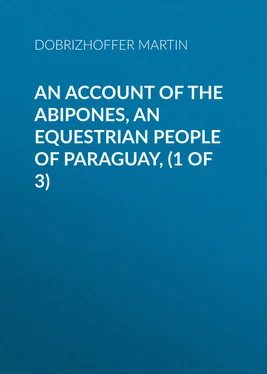Martin Dobrizhoffer - An Account of the Abipones, an Equestrian People of Paraguay, (1 of 3)
Здесь есть возможность читать онлайн «Martin Dobrizhoffer - An Account of the Abipones, an Equestrian People of Paraguay, (1 of 3)» — ознакомительный отрывок электронной книги совершенно бесплатно, а после прочтения отрывка купить полную версию. В некоторых случаях можно слушать аудио, скачать через торрент в формате fb2 и присутствует краткое содержание. Жанр: foreign_antique, foreign_prose, на английском языке. Описание произведения, (предисловие) а так же отзывы посетителей доступны на портале библиотеки ЛибКат.
- Название:An Account of the Abipones, an Equestrian People of Paraguay, (1 of 3)
- Автор:
- Жанр:
- Год:неизвестен
- ISBN:нет данных
- Рейтинг книги:3 / 5. Голосов: 1
-
Избранное:Добавить в избранное
- Отзывы:
-
Ваша оценка:
- 60
- 1
- 2
- 3
- 4
- 5
An Account of the Abipones, an Equestrian People of Paraguay, (1 of 3): краткое содержание, описание и аннотация
Предлагаем к чтению аннотацию, описание, краткое содержание или предисловие (зависит от того, что написал сам автор книги «An Account of the Abipones, an Equestrian People of Paraguay, (1 of 3)»). Если вы не нашли необходимую информацию о книге — напишите в комментариях, мы постараемся отыскать её.
An Account of the Abipones, an Equestrian People of Paraguay, (1 of 3) — читать онлайн ознакомительный отрывок
Ниже представлен текст книги, разбитый по страницам. Система сохранения места последней прочитанной страницы, позволяет с удобством читать онлайн бесплатно книгу «An Account of the Abipones, an Equestrian People of Paraguay, (1 of 3)», без необходимости каждый раз заново искать на чём Вы остановились. Поставьте закладку, и сможете в любой момент перейти на страницу, на которой закончили чтение.
Интервал:
Закладка:
Meantime, it being reported that Gomez Freyre de Andrade, governour of Rio de Janeiro, in Brazil, and the author of all these calamities, had entered their territories with his forces, to arms was the immediate cry, and each being forced along by the common impulse, the united body rolled onwards like a mighty river; you would have thought there was a second Hannibal at the gates. Thus, while the Guaranies repelled force by force, in defence of their churches and fire-sides, they are proclaimed rebels – worthier, in fact, of pity than of punishment; for maddened by their rooted hatred of the Portugueze and the love of their country, they were hurried blindly on wherever their passions impelled them. To shake off the Spanish yoke – to injure the neighbouring colonies of the Spaniards, never so much as entered their thoughts: their ancient love towards their monarch still burnt in their breasts, but it was not powerful enough to extinguish the innate love of their country.
Who, then, can wonder that the weak-minded Indian left no stone unturned, to avoid his expulsion from a land he could not fail to love, – a land pleasant in its situation, salubrious in its climate, wide in extent, the envy of the Spanish cities for its churches and other edifices, adorned with woods, with rivers, and with plains of the greatest fertility, and lastly, well stored with all the necessaries of subsistence? Joachim de la Viana, governor of Monte-Video, sent forward with a detachment of cavalry to explore the country, having leaped from his horse on the summit of an eminence, and examined through a telescope the city of S. Miguel, (a place inhabited by seven thousand Indians, and famous for its magnificent churches and famous row of buildings,) in his astonishment at the size of the place, exclaimed to the horsemen about him, – "Surely our people at Madrid are out of their senses, to deliver up to Portugal this town, which is second to none in Paraguay." This he said, though a strenuous favourer of the Portugueze, whose party he embraced to ingratiate himself with Barbara, Queen of Spain. The six other towns – those of S. Juan, S. Lewis, S. Nicholas, S. Borgia, and S. Lawrence, were also eminent for the number of their inhabitants and the beauty of their churches, though neither of them was fortified with wall, ditch, palisadoes, or even a gate.
To defend these, the inhabitants of the Uruguay assembled on all sides. Rude and undisciplined, and without a general even tolerably versed in military knowledge, they entered the unequal lists, the ridicule rather than the terror of an European army. No time, no place was left them undisturbed by fear and anxiety, as often as they were assailed by the equestrian spearmen. This was repeatedly mentioned in Gomez Freyre's journals, addressed to the Portugueze commissioners of the demarcation. On both sides the war consisted of long marches and skirmishes, attended with various success; and thus it ended, more noise having been made by both parties than blood spilt. This, however, is agreed on all hands – that the Europeans could never have penetrated to these seven towns, had all the Guarany towns come to the aid of the Uruguayans. But those who dwelt on the banks of the Parana were happily restrained from leaguing with the insurgents, by the exertions of the Jesuits. Judge from this what opinion must be formed by those who have impudently stigmatized us as the authors of the sedition, and the leaders of the rebels. Their books are as many as they are dangerous: for although they allege nothing but falsehoods, yet, with specious arguments, and pretended testimony, they seek to extort that credit which would be exploded by all Europe, were the characters of their witnesses as well known to others as to ourselves.
And now, gentle reader, a word in your ear! If the Guarany insurgents were indeed encouraged by the Jesuits, could they not have effected more against the royal forces? Destitute of the counsels and presence of the Fathers, they did their business stupidly and unprosperously; a circumstance mightily advantageous, both to the Spaniards and Portugueze, whose victory was owing to the bungling management of their opponents. About the beginning of the disturbances, one Joseph, Corregidor of S. Miguel, was elected general of their forces against the Portugueze. This Joseph, an active and courageous man, behaved like a good soldier but an execrable general, for he was as ignorant of military tactics as I am of the black art. On his falling in a chance skirmish, Nicholas Neengirù, many years Corregidor of the city of Concepçion, succeeded. Under his conduct the war was poorly carried on; and the affairs of the Uruguayans gradually declining, the seven towns were delivered up to the royal forces. But, reader, when you utter the name of Nicholas Neengirù, uncover your head and bend your knee, or rather, if you know all, burst into laughter. This is that celebrated Nicholas Neengirù whom the Europeans called King of Paraguay, whilst Paraguay itself had not an inkling of the matter. At the very time when the feigned majesty of the King of Paraguay employed every mouth and press in Europe, I saw this Nicholas Neengirù, with naked feet, and garments after the Indian fashion, sometimes driving cattle before the shambles, sometimes chopping wood in the market-place; and when I considered him and his occupation, could hardly refrain from laughter.
But mark the progress of King Nicholas's fate. To obtain for the base fiction an appearance of truth, a person in the kingdom of Quito was bribed to get money coined and stamped with the name of King Nicholas. This base money was issued both in Europe and America, and no one could doubt its being coined in Paraguay by the pretended king, where, from the want of bullion, the Catholic kings themselves had no mint. The deceit however at length appeared; on March the 20th, 1760, the artificer of the coin wrote a letter to the King, in which he confessed – "that he was compelled by the secret stings of conscience to divulge his crime," &c. This letter detected the venal wretch who instigated him to coin the money of King Nicholas.
The fame of King Nicholas and the money issued in his name gave reasonable apprehension to the Court of Madrid; but Pedro Zevallos, who was sent with an army to reclaim Paraguay, soon perceived that it was all a false alarm, and declared the same in letters to the king. If any one doubt my veracity, let him examine the Madrid newspapers, published in the October of 1768, where he will find these words: – "Whatever has been rumoured of King Nicholas is certified to be a fabulous invention." If you require yet stronger evidence, attend to what follows. The tumults in the Uruguay being settled, Nicholas went himself to the Spanish camp, and appearing, of his own accord, before the royal governour, Joseph Andonaegui, gave him an account of all his proceedings. He was quietly heard, dismissed unpunished, and continued in his office of Corregidor. Had he been even suspected of affecting the crown of Paraguay, how different would have been his treatment! Loaded with fetters, – locked in a horrible dungeon, – he would have expiated his crime by some fearful punishment, and perhaps been torn limb from limb. But let us trace the story to its source.
It is a trite proverb in Spain — La mentira es hija de algo , falsehood is the daughter of something. Those pernicious rumours which spread far and wide, like a pestilence, generally originate in some trifle of no consequence. Such was the fable of King Nicholas, which sprang from an ignorance of the Guarany language, was perpetuated by malice, and spread over all the world. Tubicha signifies great among the Guaranies; and Mburubicha , King or Cacique. Among the companies of Indians sent to plough the land, to cut and carry wood, or to ferry on the river, there is always a chief, who directs their motions, and whom they address by the title of Ñanderubicha , our chief or captain. In this manner the Uruguayan Indians called their leader, Nicholas Neengirù, Ñanderubicha , our captain; which, being heard by the Spaniards of Asumpcion, who speak a confused jargon of Spanish and Guarany, they ignorantly and wickedly asserted that the Indians called Nicholas their king. I must not here omit to mention, that, from the ignorance of the Spanish and Portugueze interpreters, the most unfavourable opinions of our affairs and the most execrable calumnies have often arisen. These men, from their ignorance of Latin and Guarany, have frequently misinterpreted our letters to governors, acquainted with Spanish only; so that deeds and expressions, entirely innocent, have been construed into crimes.
Читать дальшеИнтервал:
Закладка:
Похожие книги на «An Account of the Abipones, an Equestrian People of Paraguay, (1 of 3)»
Представляем Вашему вниманию похожие книги на «An Account of the Abipones, an Equestrian People of Paraguay, (1 of 3)» списком для выбора. Мы отобрали схожую по названию и смыслу литературу в надежде предоставить читателям больше вариантов отыскать новые, интересные, ещё непрочитанные произведения.
Обсуждение, отзывы о книге «An Account of the Abipones, an Equestrian People of Paraguay, (1 of 3)» и просто собственные мнения читателей. Оставьте ваши комментарии, напишите, что Вы думаете о произведении, его смысле или главных героях. Укажите что конкретно понравилось, а что нет, и почему Вы так считаете.












